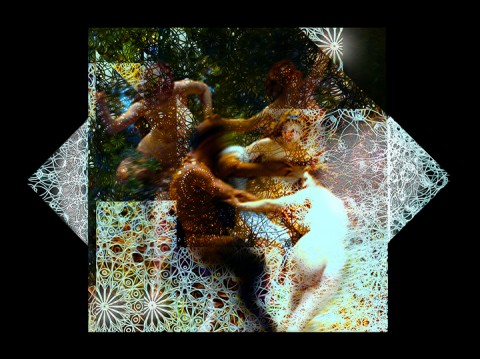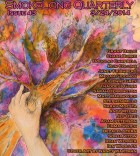Of the infinite possible universes spreading from the central probability of Stephen’s life, in 1024 of them he walks into an AA meeting and says: “I wish she would die so I could save myself the trouble of leaving her.” He hates his wife because he fucked another woman and she knew what he’d done, and he is ashamed. In fact what he wishes for is another universe in which the damage has not been done. But in other universes there is other damage.
In all possible universes he is a man of dramatic pronouncements.
Afterward, people tell him to keep coming back, and in some universes he does and in 105 universes he drinks himself to death. In one universe a man forgets his hat. In another he remembers.
In another Stephen’s wife, Sarah, is at the seasonal garage sale of the very church the AA meeting is in. She is looking for a restroom. She passes the open door of the meeting as he says it and he is so shocked and horrified he drives twelve hours to where his brother lives in New Jersey and never sees her until a decade later when, out of the infinite universes furcated from that instant, in twelve they run into each other at a bar in Pennsylvania and in six they drink together and in three they fuck for old time’s sake and in two they reunite and rekindle and in both they are miserable.
Or, he doesn’t see her there, hearing that he wishes she would die, which he does not mean, but she hears it and when he comes home she orders him out, divorces him, and while he moves out she chats with a mover, who leaves her his phone number, and she calls it and they later marry and move to Texas.
In all possible universes time is the illusion of movement through infinite mitosis, division by division, so that on a clear night Sarah might wrap a jacket around herself on the porch of her Texas two-bedroom and wonder about Stephen, and hope he’s got his drinking under control and maybe he met someone else and is happy because she, Sarah, has really got no hard feelings and knows he didn’t mean it but still she couldn’t do it anymore, not how he was, and it was for the best for her and she hopes the best for him, too, and she might contemplate the starry abyss and wonder. And that instant will last forever, and those stars will last forever, preserved in the instant of her watching, in the instant of emitting 1072 photons that will never reach her.
Or in other freakish probabilities, she does in fact die. She strolls home from the store along the railroad tracks hefting a sack of groceries, and suffers a mini-stroke as a complication of a new birth control, and she falls unconscious on the tracks—carrots and beans splayed on the ties, an olive jar shattered, its juices melting into the ground—and the BNSF limited pulling 147 coal cars to the power plant in Oshtemo grinds around the bend, brakes vainly shrieking, and shears her in half. Or instead, she takes a shower and brushes her hair before going to the store, and so the stroke assails her at home, brushing her hair, and she falls against the bathtub and cracks her head open and dies instantly.
Stephen stands seized in the door of the bathroom regarding his wife. Her vacant stare is fixed on the floor of the bathtub, in the general direction of a partially congealed pool of blood. A drop of that blood hovers between the low-hanging strands of her hair and the pool like an ache, a collision that remains a permanent millisecond away.



 The core workshop of SmokeLong Fitness is all in writing, so you can take part from anywhere at anytime. We are excited about creating a supportive, consistent and structured environment for flash writers to work on their craft in a community. We are thrilled and proud to say that our workshop participants have won, placed, or been listed in every major flash competition. Community works.
The core workshop of SmokeLong Fitness is all in writing, so you can take part from anywhere at anytime. We are excited about creating a supportive, consistent and structured environment for flash writers to work on their craft in a community. We are thrilled and proud to say that our workshop participants have won, placed, or been listed in every major flash competition. Community works.